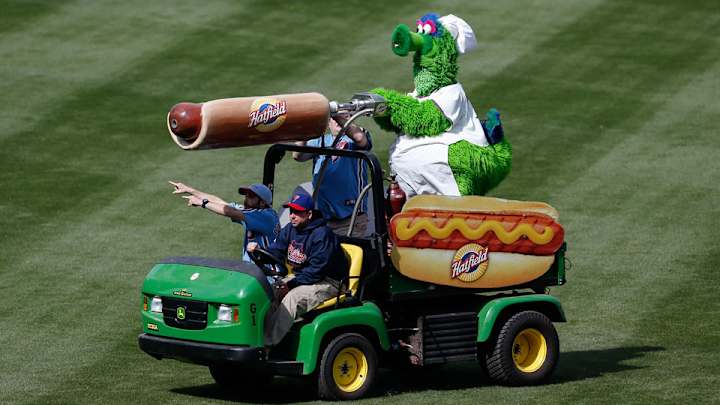Even mascots are not immune to baseball's emphasis on pace-of-game

As soon as the Nationals’ Max Scherzer struck out the Phillies’ Ryan Howard to end the fifth inning in Philadelphia on April 12, a clock flashed in the outfield at Citizens Bank Park and started counting down from 2 minutes, 25 seconds.
Major League Baseball has put added emphasis this year on shortening games, and everything that is to take place between innings—players coming and going from the field, pitchers completing their warmup throws, grounds crews cleaning the infield—must be completed in that time. But those people aren't the only ones having to make adjustments this year. So, too, are mascots.
“Oh yeah, we’re very aware of the league rules,” said Tom Burgoyne, who describes himself as (ahem) a close friend of the Phillie Phanatic. “When they send rules like this down, we get them for sure.”
[daily_cut.mlb]On this particular day, the clock began ticking almost immediately after the last pitch from Scherzer smacked into the glove of Washington catcher Wilson Ramos. Almost as soon, a gate opened in the rightfield corner and out came the Phanatic, dressed in a white apron and chef’s hat. He rode on the flatbed of a car like a furry green frenzy and launched hot dogs into the stands out of a cannon.
As a passenger in the large hot-dog-mobile, the Phanatic doesn’t have to keep track of time, like he would in his typical one-man ATV. For days like those, Burgoyne said the Phillies have even considered adding an earpiece to the inside of the costume to communicate the time.
Despite the presence of the clock—which is 2:45 for nationally televised games—the league office says not much has really changed this season.
“We didn’t change the timing guidelines,” said Chris Marinak, the senior vice president of league economics and strategy. “The amount of time that you have available to do between-inning entertainment was the same in our guidelines last year as it is this year.”
A-Rod, Astros, Trout and mighty 'pens among early trends to watch
Marinak said the clock just keeps everyone on the same page, unlike when it used to be on the umpire’s watch and invisible to everyone else. (Burgoyne said in years past if the Phanatic’s skits were running long, an umpire might help stall by wiping dirt off the plate.) So far the pace-of-play emphasis has had the desired effect. Through April 29, games were averaging 2 hours and 53 minutes, down from 3 hours and 2 minutes in 2014.
Early in his hot dog rifelry routine, the Phanatic and his troupe streaked across the outfield grass and settled along the third base line, where he shot half a dozen dogs into the crowd. The clock hit 1:30 and the car made a sharp U-turn, dodging outfielders and leaving tire tracks in the grass.
By the time the clock reached 1:05, he was on the first base line scattering more frankfurters.
The routine was carefully timed, because it can’t last the full 2:25. Tyler Barnes, the vice president of communications for the Milwaukee Brewers, said the league has been very clear that between-inning entertainment must be completed by the time the countdown clock hits 40 seconds.
Barnes wrote in an email that it hasn’t been an issue with Miller Park’s famous Sausage Race, but he also said the team has, “made it very clear to all of those involved in the logistics for the Race that this is not a recommendation, it is a requirement.”
In other words, there’s still some added pressure for Chorizo and his bratwurst buddies to sprint through the finish line.
Despite that, Marinak said he doesn’t envision a formal discipline program for teams that run long—which means Wally the Green Monster won't have to dip into any comically oversized wallets to pay fines in Boston—and the league hasn’t seen any pushback from clubs about the strict cap on entertainment time.
Book excerpt: Pedro Martinez talks 2003 season, rivalry with Yankees
“I understand where they’re coming from as far as wanting to quicken the game up,” Burgoyne said. “They know we have a job to do, and that is to entertain the fans. And hopefully we can do it within the rules.”
The clock hit 0:40 and the Phanatic retreated toward the gate from which he came. With 33 seconds left he fired one last hot dog almost straight up into the air. After it sailed into the stands, the focus shifted back to the players.
With 17 seconds to go, Washington’s Ryan Zimmerman took a final practice swing and stepped into the box. Fifteen seconds later, Sean O’Sullivan went into his windup for the first pitch of the sixth inning. The clock never even made it to zero, disappearing before the final two ticks came off.
In less than two and a half minutes, the mascot had come and gone and play had resumed, with nary a second wasted.
